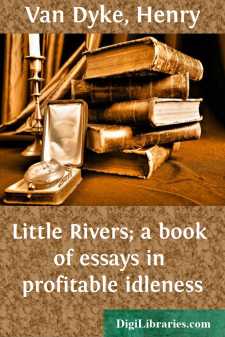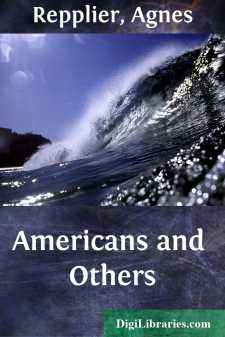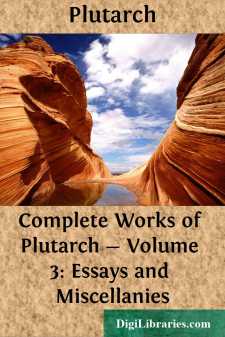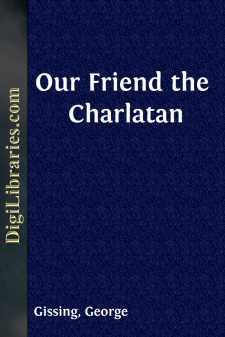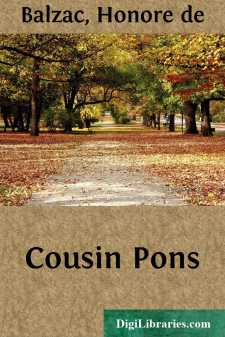Literary Collections
- American 84
- Ancient, Classical & Medieval 14
- Asian 1
- Australian & Oceanian 1
- Canadian 55
- Continental European 121
- English, Irish, Scottish, Welsh 179
- Essays 160
- General 24
- Letters 46
- Middle Eastern 1
Literary Collections Books
Sort by:
by:
Henry Van Dyke
PRELUDEAN ANGLER'S WISH IN TOWNWhen tulips bloom in Union Square,And timid breaths of vernal airAre wandering down the dusty town,Like children lost in Vanity Fair; When every long, unlovely rowOf westward houses stands aglowAnd leads the eyes toward sunset skies,Beyond the hills where green trees grow; Then weary is the street parade,And weary books, and weary trade:I'm only wishing to go...
more...
by:
Agnes Repplier
A Question of Politeness"La politesse de l'esprit consiste à penser des choses honnêtes et délicates." A great deal has been said and written during the past few years on the subject of American manners, and the consensus of opinion is, on the whole, unfavourable. We have been told, more in sorrow than in anger, that we are not a polite people; and our critics have cast about them for...
more...
PREFACE. An indistinct recollection of the very pretty little tale, called "The Bellows-Mender," suggested the plot of this Drama. The incidents are, however, greatly altered from those in the tale, and the characters entirely re-cast. Having long had a wish to illustrate certain periods of the French history, so, in the selection of the date in which the scenes of this play are laid, I saw...
more...
by:
J. Atwood Slater
PAINTING. From the WESTERN DAILY PRESS, Feb. 20th, 1901. AN IMPRESSION OF "ECCE HOMO." To the Editor of the Western Daily Press. Sir,—First impressions forced upon me by an inspection of the picture, "Ecce Homo," by Mons. de Munkacsy, would be succinctly expressed in few words. It is haply, although not highly, inspired. It constitutes a work of laborious but of average ability, and...
more...
I. THE SCENE Yes, of course it is an experiment! But it is made in corpore vili. It is not irreparable, and there is no reason, more's the pity, why I should not please myself. I will ask—it is a rhetorical question which needs no answer—what is a hapless bachelor to do, who is professionally occupied and tied down in a certain place for just half the year? What is he to do with the other...
more...
by:
Plutarch
Epicurus's great confidant and familiar, Colotes, set forth a book with this title to it, that according to the tenets of the other philosophers it is impossible to live. Now what occurred to me then to say against him, in the defence of those philosophers, hath been already put into writing by me. But since upon breaking up of our lecture several things have happened to be spoken afterwards in...
more...
by:
Harold Bindloss
CHAPTER I SALLY CREIGHTON The frost outside was bitter, and the prairie which rolled back from Lander’s in long undulations to the far horizon, gleamed white beneath the moon, but there was warmth and brightness in Stukely’s wooden barn. The barn stood at one end of the little, desolate settlement, where the trail that came up from the railroad thirty miles away forked off into two wavy ribands...
more...
The Challenge of the North I Oskar Hedin, head of the fur department of old John McNabb's big store, looked up from his scrutiny of the Russian sable coat spread upon a table before him, and encountered the twinkling eyes of old John himself. "It's a shame to keep this coat here—and that natural black fox piece, too. Who is there in Terrace City that's got thirty thousand dollars...
more...
by:
George Gissing
CHAPTER I As he waited for his breakfast, never served to time, Mr. Lashmar drummed upon the window-pane, and seemed to watch a blackbird lunching with much gusto about the moist lawn of Alverholme Vicarage. But his gaze was absent and worried. The countenance of the reverend gentleman rarely wore any other expression, for he took to heart all human miseries and follies, and lived in a ceaseless mild...
more...
by:
Honore de Balzac
COUSIN PONS Towards three o'clock in the afternoon of one October day in the year 1844, a man of sixty or thereabouts, whom anybody might have credited with more than his actual age, was walking along the Boulevard des Italiens with his head bent down, as if he were tracking some one. There was a smug expression about the mouth—he looked like a merchant who has just done a good stroke of...
more...


